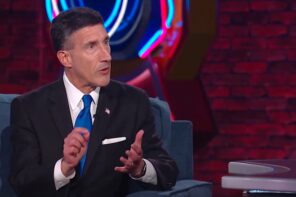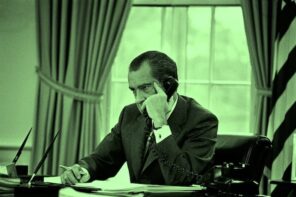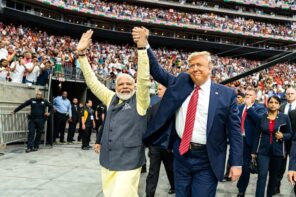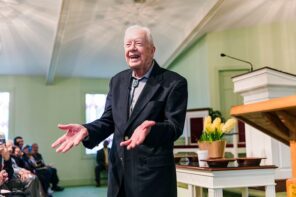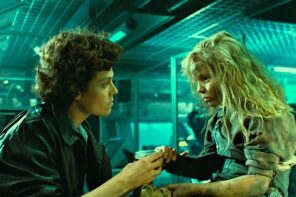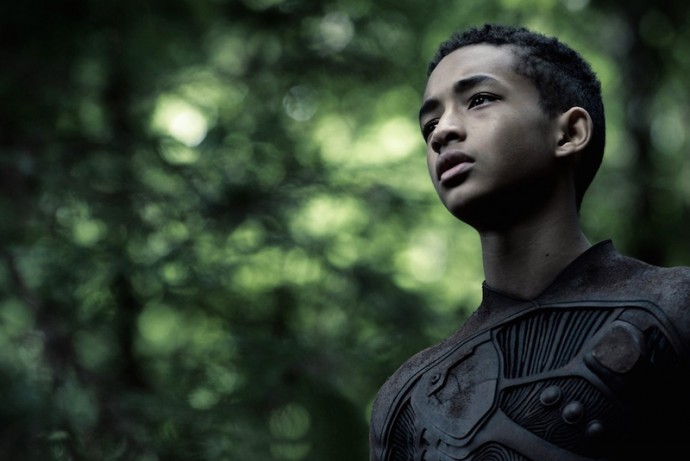The most important movie to watch at this moment in America, especially for Christians, is After Earth, starring Will Smith and his son Jaden. The 2013 science-fiction movie was panned by critics and spent just a few weeks in the public eye, but it captures perfectly our current situation.
It is the story of a father and son stranded together on an extremely dangerous planet, Earth. Long ago abandoned by humanity, this future Earth is now overrun with outsized predators, toxic plants, and wildly unstable weather. The ship that carried them has crash landed and the elder Smith’s character lies in the ship’s shattered hull with broken bones unable to move. From that captive position he charges his son with an almost impossible task: to traverse miles of the most dangerous terrain imaginable and activate the beacon that will call for help. There is one complicating factor, however. The son will not be alone on his journey. He will be hunted by a creature skilled at killing.
The father knows this predator. Indeed the father became a famous general precisely because of his ability to defeat the creature, which is blind but hunts by smelling fear. The father’s unique ability is to silence his fear, but the imperiled son has only his father’s voice to guide him as he journeys toward the beacon. There are two memorable pieces of wisdom he gives to his son: “Root yourself in this present moment!” and “Danger is real, but fear is a choice.”
After Earth is not about race, but it is. After Earth is not about America, but it is. It’s a movie about Eric Garner, Michael Brown, Trayvon Martin and an almost endless host of others (from Jordan Davis to Renisha McBride to Amadou Diallo). It’s about a real place we as Americans inhabit that is permeated with violence and fear, and unfortunately we Christians have yet to reckon seriously with this place and our own culpability in its creation. Our present moment demands we face the horror of the social world we help to sustain.
Root yourself in this present moment!
Our present moment is not about the occasional killing of black men, or about poor training of police officers, or even about better relationships between law enforcement and black and Hispanic communities. It is about violence. We have been bathed in it, and nurtured in it. It flows through our veins and covers our skin like a thick layer of sweat. From our seduction by guns to our formation as a people within gun cultures, Americans have made weapons part of our national confession, “….the right of the people to keep and bear arms shall not be infringed.” We Christians have rarely resisted that seduction or that formation. In fact we helped create it on both the frontier and the plantation, and bound to this seduction and formation has been our blind commitment to abstract ideas of law and order.
Law and order have always been hallowed words on the American landscape filled with two abiding realities: our racial animus and our obsession with property. We repeat the mistake continuously in this country of trying to address our racial animus as though it is a virus that occasionally attacks our social body, rather than seeing that racial animus is a constituting reality of our social body. The ideas of law and order have always encoded the work of white bodies controlling dark bodies for the sake of controlling the land, organizing spaces of commerce, and monitoring the movements of racial others. We live always in the midst of geographic struggles with deep racial underpinnings, where policing presence tasked with controlling space moves unremittingly toward confrontation with black bodies, whether in malls, parks, neighborhoods, or stores.
We live also in the midst of a horrible calculus, the weighing of human life against private property and commerce. Only in a distorted world turned completely into commodity, could a life be weighed against private property. Yet we hear constantly the comparison between loss of life and the destruction of property as though these things are on the same plane of moral existence. Black life has always lost out in that calculus, because the ideas of law and order have overwhelmingly been orientated toward the protection of property and not black bodies. Christianity in America has much too often served as the high priest of this sick reality of law and order, too quickly aligning our biblical visions of sin and punishment to ideas of crime and punishment, and lending our support to forms of policing that are betrothed to the control of space and married to violence.
Danger is real, but fear is a choice.
Violence has won in America, and we live always in the break, in the silence, like that of a musical break between movements where violence is being prepared to answer back to violence, and where someone is about to be seduced into believing that peace and stability will be established through violence. Black life is always in the break, and we have heard the before and after for so long that we have grown accustomed to it, like white noise. Black Death in America has reached a sanctioned ubiquity rooted in the normalization of fear.
From its Christian and colonial beginnings, America has always trafficked in the fear of black people, its political and social potency too tempting a resource to leave untapped. The continuous use of racialized fear has damaged our collective psyche by entangling in us violence, danger, and fear, woven so tightly together now that to think the one conjures the others. This is why the idea of placing cameras on the bodies of the police to record their actions will never be enough. It takes vision to see, and until the prevailing vision of black bodies is altered from dangerous to fully human, what will be seen with almost every violent incident will be a police officer in danger protecting themselves and us. A camera on a police officer is always poised to become a reality television video game, complete with weapon and target.
There is danger in this world, and police officers live near harm and death. Such proximity demands not only our concern for officers but more helpfully our efforts to draw policing away from the entanglement of race, fear, violence, and the control of space for the sake of property values. Too often, Christians in America have given sanctuary to the spirit of fear, commending a form of policing that makes violence a surgeon’s scalpel, imagining our safety in the illusion of its measured use. Violence knows no measure.
We Christians should remember this, because violence was turned against the body of our God in the crucifixion of Jesus. We need, at this mournful moment, a Christianity that rejects its colonial legacy of binding danger to nonwhite bodies, and refuses to blindly defend the ideas of law and order, and finally, fully renounces violence aimed at black folks. Most importantly, we need Christians willing to live out such Christianity.
After Earth is not a perfect film for moral instruction. The son must kill the predator creature in order not to be killed. Such is the case in a world formed in the wake of violence and death. Yet the son’s final words to his father express his desire to leave his father’s world of predator creatures, to which his father says, “me too.”
While it’s not possible to leave our world of predator creatures, what can be left behind is the fear that draws the predator creature out of us and sends it marauding through black and Hispanic communities. What must be left behind is a form of policing resourced in part by a sick Christianity at ease with violence as necessary to maintaining law and order.
